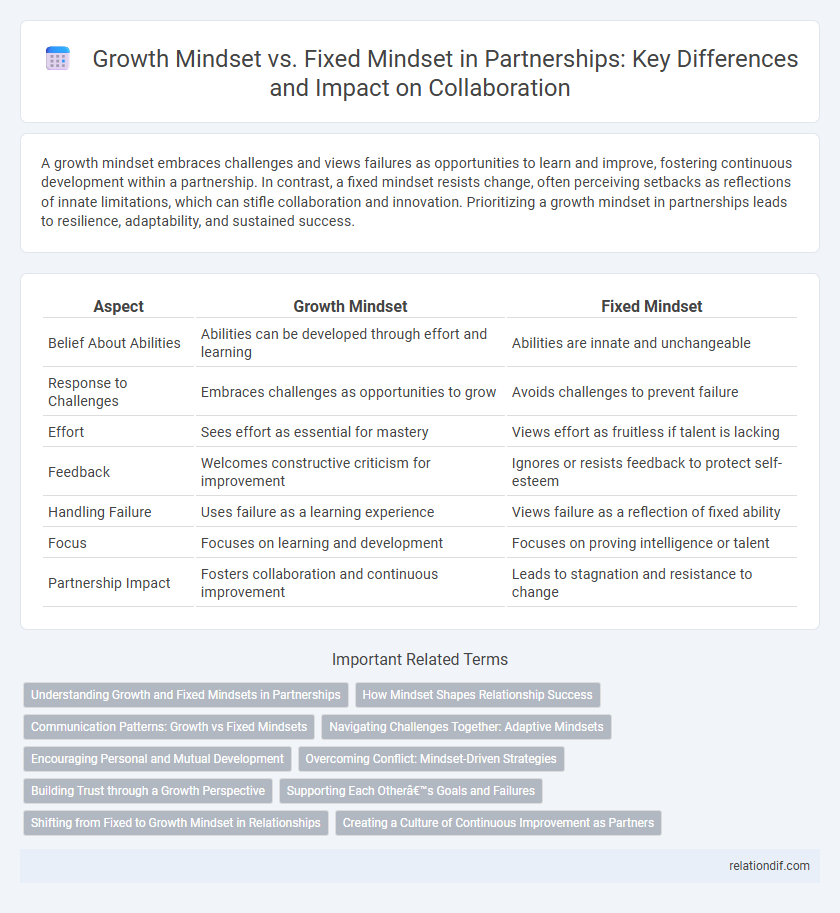A growth mindset embraces challenges and views failures as opportunities to learn and improve, fostering continuous development within a partnership. In contrast, a fixed mindset resists change, often perceiving setbacks as reflections of innate limitations, which can stifle collaboration and innovation. Prioritizing a growth mindset in partnerships leads to resilience, adaptability, and sustained success.
Table of Comparison
| Aspect | Growth Mindset | Fixed Mindset |
|---|---|---|
| Belief About Abilities | Abilities can be developed through effort and learning | Abilities are innate and unchangeable |
| Response to Challenges | Embraces challenges as opportunities to grow | Avoids challenges to prevent failure |
| Effort | Sees effort as essential for mastery | Views effort as fruitless if talent is lacking |
| Feedback | Welcomes constructive criticism for improvement | Ignores or resists feedback to protect self-esteem |
| Handling Failure | Uses failure as a learning experience | Views failure as a reflection of fixed ability |
| Focus | Focuses on learning and development | Focuses on proving intelligence or talent |
| Partnership Impact | Fosters collaboration and continuous improvement | Leads to stagnation and resistance to change |
Understanding Growth and Fixed Mindsets in Partnerships
In partnerships, embracing a growth mindset fosters collaboration, resilience, and continuous improvement by encouraging partners to learn from challenges and adapt together. A fixed mindset limits partnership potential by resisting change and viewing setbacks as insurmountable obstacles, hindering mutual progress. Understanding these mindsets enables partners to cultivate open communication, shared goals, and joint innovation essential for long-term success.
How Mindset Shapes Relationship Success
A growth mindset fosters open communication and resilience, enabling partners to learn from conflicts and adapt to challenges, which enhances relationship success. In contrast, a fixed mindset may lead to defensive behaviors and resistance to change, limiting emotional intimacy and problem-solving capacity. Embracing a growth mindset cultivates trust and mutual support, essential elements for long-term partnership growth and satisfaction.
Communication Patterns: Growth vs Fixed Mindsets
Partnerships thrive when communication patterns reflect a growth mindset, emphasizing openness, active listening, and adaptability. Fixed mindset communication often involves defensiveness and resistance to feedback, hindering collaboration and problem-solving. Embracing growth-oriented dialogue fosters mutual trust, continuous learning, and stronger, more resilient partnerships.
Navigating Challenges Together: Adaptive Mindsets
Partnerships thrive when both parties adopt a growth mindset, viewing challenges as opportunities to learn and evolve rather than insurmountable obstacles. Embracing adaptability fosters open communication, resilience, and collaborative problem-solving, enabling the team to navigate uncertainties with confidence. A fixed mindset limits progress by causing resistance to change and fear of failure, undermining long-term success in partnership dynamics.
Encouraging Personal and Mutual Development
Encouraging a growth mindset in partnerships fosters continuous personal and mutual development by embracing challenges and learning from setbacks. This approach enhances collaboration, as partners remain open to feedback and adaptable to change, promoting resilience and innovation. Prioritizing growth mindset over a fixed mindset drives long-term success through collective effort and shared progress.
Overcoming Conflict: Mindset-Driven Strategies
Growth mindset fosters collaboration by encouraging partners to view conflicts as opportunities for learning and improvement, enhancing communication and problem-solving skills. Fixed mindset often leads to defensive reactions and resistance to change, hindering resolution and damaging partnerships. Embracing growth-oriented strategies such as active listening and feedback integration accelerates conflict resolution and strengthens trust within partnerships.
Building Trust through a Growth Perspective
A growth mindset fosters openness to learning and adaptability, essential for building trust in partnerships. Partners who embrace challenges and view setbacks as opportunities strengthen collaboration and mutual respect. This perspective encourages transparent communication, continuous improvement, and resilient relationships that drive long-term success.
Supporting Each Other’s Goals and Failures
A growth mindset fosters collaboration by encouraging partners to learn from failures and celebrate progress toward shared goals, strengthening the partnership's resilience. Supporting each other's goals involves recognizing individual efforts and providing constructive feedback that promotes continuous improvement. Embracing challenges together transforms setbacks into opportunities for mutual growth and deeper trust.
Shifting from Fixed to Growth Mindset in Relationships
Shifting from a fixed mindset to a growth mindset in relationships fosters open communication, resilience, and mutual development, enabling partners to navigate challenges with optimism. Embracing growth encourages learning from conflicts and valuing effort over innate traits, strengthening trust and emotional connection. This mindset shift enhances long-term partnership success by cultivating adaptability and continuous personal and relational improvement.
Creating a Culture of Continuous Improvement as Partners
Cultivating a growth mindset within partnerships fosters resilience, adaptability, and innovation by encouraging continuous learning and open feedback. Embracing this perspective enables partners to overcome challenges collaboratively and enhance collective performance. Developing a culture of continuous improvement ensures sustained success and strong, evolving strategic alliances.
Growth mindset vs Fixed mindset Infographic

 relationdif.com
relationdif.com